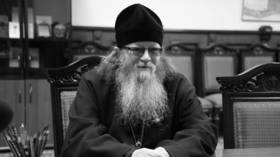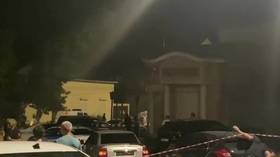Terrorist attacks in southern Russia: What we know so far
Militants have targeted synagogues, churches, and the police in the Russian region of Dagestan
The southern Russian region of Dagestan was rocked on Sunday by a series of deadly attacks in two major cities, which claimed the lives of multiple civilians and at least 15 police officers, as assailants deliberately targeted synagogues and Orthodox Christian churches.
Where it happened
Dagestan is one of several Muslim-majority regions in Russia’s North Caucasus, which stretches along the coast of the Caspian Sea. The tragic scenes unfolded in the regional capital, Makhachkala, and Derbent, a large city 120km to the south.
Derbent attacks
During a raid on a Christian church in the city, militants brutally killed its archpriest, Father Nikolay Kotelnikov, security officials confirmed. The gunmen broke into the church on Pentecost Sunday after the evening service and reportedly slit the 66-year-old man’s throat, after killing a guard.
The Derbent synagogue that came under attack had recently strengthened its security, with a police squad stationed outside and private security guards on the premises, according to the Russian Jewish Congress, a national religious organization.
Police and security personnel were the first to confront the gunmen and were killed by the attackers, who raided the synagogue around 40 minutes before an evening prayer. The terrorists then used firebombs to set the building on fire.
Makhachkala attacks
Violence in the regional capital apparently began with a raid on a traffic police post. Among multiple videos circulating online, one shows a group of three men. Two of them are firing weapons and the third appears to be looting a police car.
Little confirmed information about the events in Makhachkala was immediately available. The Russian Jewish Congress confirmed that a synagogue in the city was attacked in a similar manner to the one in Derbent.
Some media outlets claimed that militants had taken hostages at a Christian church in Makhachkala, but reports later clarified that over a dozen people had barricaded themselves inside due to a firefight nearby. They were never in danger, according to Dagestan officials.
Counter-terrorist operation
The manhunt in Derbent lasted for several hours. The police chief from the neighboring town of Dagestanskie Ogni came to aid fellow officers and was fatally injured by the militants, the regional Interior Ministry reported.
The National Antiterrorism Committee (NAC) declared the active phase of the operation in Derbent over around 11pm local time, confirming that two assailants had been neutralized.
The counterterrorist operation in Makhachkala was still ongoing as of 2am local time, with at least three militants killed and the authorities still searching for possible accomplices, according to the governor of the Republic of Dagestan, Sergey Melikov.
Casualties
Reports of the death toll have been inconsistent. The authorities confirmed at least 15 fatalities among police officers, and several civilian casualties.
The regional Interior Ministry said that a total of 16 people, including 13 policemen, had been rushed to the main regional hospital in Makhachkala throughout the day.
Perpetrators
Multiple media reports citing police sources claimed that two of the militants killed in Makhachkala were identified as sons of a municipal head. The man was reportedly arrested and is likely to lose his job, according to the media. Other Russian officials described the gunmen as members of an international terrorist organization.
‘Diabolic’ goal
Representatives of Russian Jewish, Christian, and Muslim communities have universally condemned the attacks on the places of worship. The Dagestan Muftiate called the brutality antithetical to Islam.
Patriarch Kirill, the head of the Russian Orthodox Church, said the perpetrators were seeking to incite religious hatred, calling it “diabolic.”
“Everything possible must be done to prevent even the possibility of radicalization of religious life, to exclude any forms of extremism and ethnic enmity,” he stated.







Comments are closed.